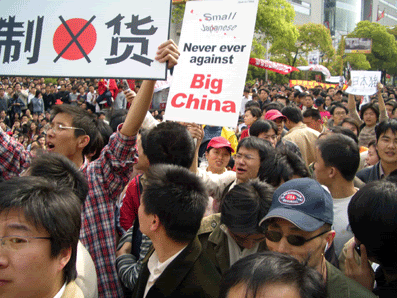More on China and Japan

I recently got hold of a copy of 'The Rape of Nanking' by Iris Chang, which I think has brought me closer to an understanding of the mindset of young Chinese people.
Although I've read quite a bit on what the Nazis did, the massacres in Rwanda and in Cambodia and also what took place here during the Cultural Revolution, and am I guess like a lot of people desensitized to accounts of horrific violence, I could not finish the book. The things that she recounts are beyond and beneath my comprehension of what human beings can do to each other. It actually had me in tears at several points, and I can't say that I would 'recommend' reading the book to anyone. Without wanting to sound too trite, perhaps it's no accident that after years of researching what took place the author took her own life.
As I say I've been confronted with terrible violence in books and films throughout my own life, and I couldn't deal with written descriptions of what took place. Imagine, then, how young Chinese schoolchildren feel, confronted again and again with not just words but also images and film footage depicting the most inconceivable tortures and acts of barbarity.
Of course, they generally do not know what happened in their own country's recent past, and those who do are encouraged not to reflect on what their leaders have done or are up to. The only political feeling they are permitted is hatred of the Japanese. And young people like to get angry, as it says here, in one of the most incisive commentaries I've come across in years:
Chairman Mao knew it: it enabled him to launch the Cultural Revolution. As part of their post-adolescent struggle for identity, young students yearn for freedom. If they are not allowed to express their opinions, they have to finesse it, and pretend - somehow - that they identify whole-heartedly with the nation, and that such an identification has been arrived at with their consent and with a complete understanding of right and wrong. In a country where one is not permitted to express dissent, the only way to maintain one's integrity is to pretend that one's patriotism is freely chosen, and based on truth. And so, our patriot-rebels do not want to hear about the various apologies made by Japan over the years, because they have invested so much in the belief that their anger is rational and based on Japan's refusal to apologize. (from Running Dog)
Maybe in the future the contradiction will become more apparent to them, and they will begin to see this incredibly cruel and bloody episode of their country's history in the wider context of other murderous periods in China's past, and realise that absolute power leads to absolute horror. For the moment, the attitude someone talked about on an English teachers' message board is probably the best that can be hoped for:
I asked my Teaching Assistant what she thought about this issue the other night. She answered (rather predictably) that she hated what Japan DID. When I asked her if she would try and be friends with a Japanese person if they came here to teach, she said yes. By the end of the conversation, we'd established that she hated what the Japanese did, but that it happened a few generations ago, and that an individual Japanese person could be quite nice. Rather reasonable, really.